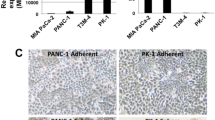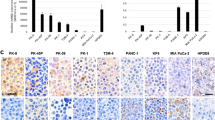Abstract
Autophagy is a tightly regulated lysosomal self-digestion process that can both promote and impede tumorigenesis. Here, we utilize a three-dimensional (3D) culture model to address how interactions between autophagy and the phosphatidylinositol 3-kinase(PI3K)/Akt/mammalian target of rapamycin pathway impact the malignant behavior of cells carrying a tumor-derived, activating mutation in PI3K (PI3K-H1047R). In this model, autophagy simultaneously mediates tumor-suppressive and -promoting functions within individual glandular structures. In 3D culture, constitutive PI3K activation overcomes proliferation arrest and promotes resistance to anoikis in the luminal space, resulting in aberrant structures with filled lumen. Inhibiting autophagy in PI3K-H1047R structures triggers luminal cell apoptosis, resulting in lumen clearance. At the same time, autophagy gene depletion strongly enhances PI3K-H1047R cell proliferation during 3D morphogenesis, revealing an unexpected role for autophagy in restricting proliferation driven by PI3K activation. Intriguingly, overexpression of the autophagy cargo receptor p62/SQSTM1 in PI3K-H1047R cells is sufficient to enhance cell proliferation, activate the extracellular signal-related kinase/mitogen-activated protein kinase pathway and to promote epidermal growth factor-independent proliferation in 3D culture. Overall, these results indicate that autophagy antagonizes specific aspects of oncogenic PI3K transformation, with the loss of autophagy promoting proliferation.
This is a preview of subscription content, access via your institution
Access options
Subscribe to this journal
Receive 50 print issues and online access
$259.00 per year
only $5.18 per issue
Buy this article
- Purchase on Springer Link
- Instant access to full article PDF
Prices may be subject to local taxes which are calculated during checkout








Similar content being viewed by others
References
He C, Klionsky DJ . Regulation mechanisms and signaling pathways of autophagy. Annu Rev Genet 2009; 43: 67–93.
Kondo Y, Kanzawa T, Sawaya R, Kondo S . The role of autophagy in cancer development and response to therapy. Nat Rev Cancer 2005; 5: 726–734.
Chen N, Debnath J . Autophagy and tumorigenesis. FEBS Lett 2010; 584: 1427–1435.
Liang XH, Jackson S, Seaman M, Brown K, Kempkes B, Hibshoosh H et al. Induction of autophagy and inhibition of tumorigenesis by beclin 1. Nature 1999; 402: 672–676.
Qu X, Yu J, Bhagat G, Furuya N, Hibshoosh H, Troxel A et al. Promotion of tumorigenesis by heterozygous disruption of the beclin 1 autophagy gene. J Clin Invest 2003; 112: 1809–1820.
Yue Z, Jin S, Yang C, Levine AJ, Heintz N . Beclin 1, an autophagy gene essential for early embryonic development, is a haploinsufficient tumor suppressor. Proc Natl Acad Sci USA. 2003; 100: 15077–15082.
Inami Y, Waguri S, Sakamoto A, Kouno T, Nakada K, Hino O et al. Persistent activation of Nrf2 through p62 in hepatocellular carcinoma cells. J Cell Biol 2011; 193: 275–284.
Takamura A, Komatsu M, Hara T, Sakamoto A, Kishi C, Waguri S et al. Autophagy-deficient mice develop multiple liver tumors. Genes Dev 2011; 25: 795–800.
Karantza-Wadsworth V, Patel S, Kravchuk O, Chen G, Mathew R, Jin S et al. Autophagy mitigates metabolic stress and genome damage in mammary tumorigenesis. Genes Dev 2007; 21: 1621–1635.
Mathew R, Kongara S, Beaudoin B, Karp CM, Bray K, Degenhardt K et al. Autophagy suppresses tumor progression by limiting chromosomal instability. Genes Dev 2007; 21: 1367–1381.
Samuels Y, Wang Z, Bardelli A, Silliman N, Ptak J, Szabo S et al. High frequency of mutations of the PIK3CA gene in human cancers. Science 2004; 304: 554.
Kang S, Bader AG, Vogt PK . Phosphatidylinositol 3-kinase mutations identified in human cancer are oncogenic. Proc Natl Acad Sci USA. 2005; 102: 802–807.
Isakoff SJ, Engelman JA, Irie HY, Luo J, Brachmann SM, Pearline RV et al. Breast cancer-associated PIK3CA mutations are oncogenic in mammary epithelial cells. Cancer Res 2005; 65: 10992–11000.
Debnath J, Muthuswamy SK, Brugge JS . Morphogenesis and oncogenesis of MCF-10A mammary epithelial acini grown in three-dimensional basement membrane cultures. Methods 2003; 30: 256–268.
Debnath J, Mills KR, Collins NL, Reginato MJ, Muthuswamy SK, Brugge JS . The role of apoptosis in creating and maintaining luminal space within normal and oncogene-expressing mammary acini. Cell 2002; 111: 29–40.
Petiot A, Ogier-Denis E, Blommaart EF, Meijer AJ, Codogno P . Distinct classes of phosphatidylinositol 3'-kinases are involved in signaling pathways that control macroautophagy in HT-29 cells. J Biol Chem 2000; 275: 992–998.
Klionsky DJ, Abeliovich H, Agostinis P, Agrawal DK, Aliev G, Askew DS et al. Guidelines for the use and interpretation of assays for monitoring autophagy in higher eukaryotes. Autophagy 2008; 4: 151–175.
Fung C, Lock R, Gao S, Salas E, Debnath J . Induction of autophagy during extracellular matrix detachment promotes cell survival. Mol Biol Cell 2008; 19: 797–806.
Kanazawa T, Taneike I, Akaishi R, Yoshizawa F, Furuya N, Fujimura S et al. Amino acids and insulin control autophagic proteolysis through different signaling pathways in relation to mTOR in isolated rat hepatocytes. J Biol Chem 2004; 279: 8452–8459.
Debnath J, Walker SJ, Brugge JS . Akt activation disrupts mammary acinar architecture and enhances proliferation in an mTOR-dependent manner. J Cell Biol 2003; 163: 315–326.
Luiken JJ, Aerts JM, Meijer AJ . The role of the intralysosomal pH in the control of autophagic proteolytic flux in rat hepatocytes. Eur J Biochem 1996; 235: 564–573.
Amaravadi RK, Lippincott-Schwartz J, Yin XM, Weiss WA, Takebe N, Timmer W et al. Principles and current strategies for targeting autophagy for cancer treatment. Clin Cancer Res 2011; 17: 654–666.
Debnath J, Brugge JS . Modelling glandular epithelial cancers in three-dimensional cultures. Nat Rev Cancer 2005; 5: 675–688.
Bjorkoy G, Lamark T, Brech A, Outzen H, Perander M, Overvatn A et al. p62/SQSTM1 forms protein aggregates degraded by autophagy and has a protective effect on huntingtin-induced cell death. J Cell Biol 2005; 171: 603–614.
Mathew R, Karp CM, Beaudoin B, Vuong N, Chen G, Chen HY et al. Autophagy suppresses tumorigenesis through elimination of p62. Cell 2009; 137: 1062–1075.
Pankiv S, Clausen TH, Lamark T, Brech A, Bruun JA, Outzen H et al. p62/SQSTM1 binds directly to Atg8/LC3 to facilitate degradation of ubiquitinated protein aggregates by autophagy. J Biol Chem 2007; 282: 24131–24145.
Kimmelman AC . The dynamic nature of autophagy in cancer. Genes Dev 2011; 25: 1999–2010.
Guo JY, Chen HY, Mathew R, Fan J, Strohecker AM, Karsli-Uzunbas G et al. Activated Ras requires autophagy to maintain oxidative metabolism and tumorigenesis. Genes Dev 2011; 25: 460–470.
Yang S, Wang X, Contino G, Liesa M, Sahin E, Ying H et al. Pancreatic cancers require autophagy for tumor growth. Genes Dev 2011; 25: 717–729.
Lock R, Roy S, Kenific CM, Su JS, Salas E, Ronen SM et al. Autophagy facilitates glycolysis during Ras-mediated oncogenic transformation. Mol Biol Cell 2011; 22: 165–178.
Debnath J . Detachment-induced autophagy in three-dimensional epithelial cell cultures. Methods Enzymol 2009; 452: 423–439.
Engelman JA . Targeting PI3K signalling in cancer: opportunities, challenges and limitations. Nat Rev Cancer 2009; 9: 550–562.
Janku F, McConkey DJ, Hong DS, Kurzrock R . Autophagy as a target for anticancer therapy. Nat Rev Clin Oncol 2011; 8: 528–539.
Moscat J, Diaz-Meco MT . Feedback on fat: p62-mTORC1-autophagy connections. Cell 2011; 147: 724–727.
Acknowledgements
We thank Drs William Weiss, Qiwen Fan and members of the Debnath lab for critically reading the manuscript, and Drs William Weiss and Terge Johansen for generously providing constructs. Grant support to JD includes the NIH (RO1 CA126792 and ARRA supplement CA126792-S1) and the DOD BCRP (W81XWH-11-1-0130). NE received a Short-Term Stay Fellowship from the Spanish Ministry of Health. RL is a DOD BCRP Predoctoral Scholar (W81XWH-08-1-0759).
Author information
Authors and Affiliations
Corresponding author
Ethics declarations
Competing interests
The authors declare no conflict of interest.
Additional information
Supplementary Information accompanies the paper on the Oncogene website
Rights and permissions
About this article
Cite this article
Chen, N., Eritja, N., Lock, R. et al. Autophagy restricts proliferation driven by oncogenic phosphatidylinositol 3-kinase in three-dimensional culture. Oncogene 32, 2543–2554 (2013). https://doi.org/10.1038/onc.2012.277
Received:
Revised:
Accepted:
Published:
Issue Date:
DOI: https://doi.org/10.1038/onc.2012.277
Keywords
This article is cited by
-
Effect of Streptococcus anginosus on biological response of tongue squamous cell carcinoma cells
BMC Oral Health (2021)
-
Crosstalk between mechanotransduction and metabolism
Nature Reviews Molecular Cell Biology (2021)
-
Identification of an autophagy-related gene signature that can improve prognosis of hepatocellular carcinoma patients
BMC Cancer (2020)
-
Contact inhibition controls cell survival and proliferation via YAP/TAZ-autophagy axis
Nature Communications (2018)
-
Metformin Inhibits Cyst Formation in a Zebrafish Model of Polycystin-2 Deficiency
Scientific Reports (2017)



